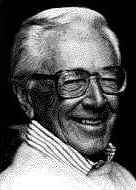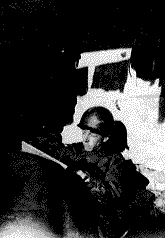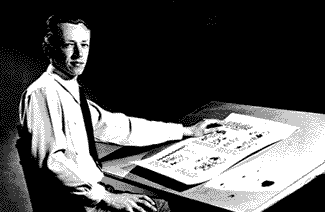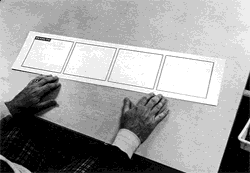KINGSTON
2000
 Charles Schulz is both the brains and the brawn behind nearly 50 years
of Peanuts comics.
He single-handedly
designs, researches, writes, and draws every panel and strip that
appear in daily
and Sunday newspapers around the world.
Charles Schulz is both the brains and the brawn behind nearly 50 years
of Peanuts comics.
He single-handedly
designs, researches, writes, and draws every panel and strip that
appear in daily
and Sunday newspapers around the world.
 For Charles
Schulz, military life provided both a welcomed change of pace and a shocking
confirmation
that life would never be the same again. It was in the service that
Schulz developed the
confidence and
work ethic that enable his success today. He excelled as an infantryman,
a staff
sergeant, and the leader of a machine-gun squad. For the most part,
Schulz's artistic
aspirations
were put on hold during his years in the service. He did, however,
become known
as the resident illustrator and he dutifully decorated soldiers' letters
home
with cartoons
of barracks life.
For Charles
Schulz, military life provided both a welcomed change of pace and a shocking
confirmation
that life would never be the same again. It was in the service that
Schulz developed the
confidence and
work ethic that enable his success today. He excelled as an infantryman,
a staff
sergeant, and the leader of a machine-gun squad. For the most part,
Schulz's artistic
aspirations
were put on hold during his years in the service. He did, however,
become known
as the resident illustrator and he dutifully decorated soldiers' letters
home
with cartoons
of barracks life.
 Once back in Minn. following
the war, it was "Timeless Topix," a small Roman Catholic
magazine, that offered Schulz his first job in cartooning. The magazine
hired him to letter already drawn comics.
Although the
position offered him no creative opportunities, it did keep Schulz on track
and helped him to hone his lettering skills. Schulz took on a second
job with his alma mater, Art Instruction Schools.
There, Schulz
grew with the support of an artistic community. He practiced his drawing
and met many
of the people
who would inspire his future work (including a friend named Charlie Brown
and a girl with red hair
who broke his
heart).
Buoyed
by his success in the national magazine "The Saturday Evening Post", Schulz
went on to land a weekly comic feature called "L'il Folks" in the St. Paul
Pioneer Press. Marketing "L'il Folks" to syndicates around the
country, Schulz finally received a reply from Jim Freeman at United Feature
Syndicate. Freeman, a well-respected editor with 30 years'
experience, wisely suggested that Schulz expand the comic from one panel
to a strip format. Schulz had already been toying with the idea and jumped
at the chance to accommodate the syndicate.
Once back in Minn. following
the war, it was "Timeless Topix," a small Roman Catholic
magazine, that offered Schulz his first job in cartooning. The magazine
hired him to letter already drawn comics.
Although the
position offered him no creative opportunities, it did keep Schulz on track
and helped him to hone his lettering skills. Schulz took on a second
job with his alma mater, Art Instruction Schools.
There, Schulz
grew with the support of an artistic community. He practiced his drawing
and met many
of the people
who would inspire his future work (including a friend named Charlie Brown
and a girl with red hair
who broke his
heart).
Buoyed
by his success in the national magazine "The Saturday Evening Post", Schulz
went on to land a weekly comic feature called "L'il Folks" in the St. Paul
Pioneer Press. Marketing "L'il Folks" to syndicates around the
country, Schulz finally received a reply from Jim Freeman at United Feature
Syndicate. Freeman, a well-respected editor with 30 years'
experience, wisely suggested that Schulz expand the comic from one panel
to a strip format. Schulz had already been toying with the idea and jumped
at the chance to accommodate the syndicate.
The new strip
format was different from other "kid strips" of the time in that each strip
dealt with only a brief incident. The result was a strip with only
four panels and a concept that United Feature Syndicate fell in love with.
 The celebration
was short-lived, however, when Schulz learned of the syndicate's
first major decision. Because of legal issues surrounding the name "L'il
Folks" ("Little Folks" and "L'il Abner" already existed), the strip was
renamed "PEANUTS." This name made Schulz cringe. To this day, he
feels the name connotes "insignificant" or "unimportant."
But the syndicate
and the newspaper market loved the idea. The strip, with its small size
and matching name, was marketed as the flexible format for any newspaper.
The strip was touted as "The Greatest Little Sensation Since Tom Thumb."
Little attention was given to its insightful text and endearing drawings.
But the comic's "foot" was in the door.
It took
several years for readers to grow attached to the PEANUTS gang. But nearly
fifty years later, "PEANUTS" has grown into one of the longest running,
most popular comics of all time.
The celebration
was short-lived, however, when Schulz learned of the syndicate's
first major decision. Because of legal issues surrounding the name "L'il
Folks" ("Little Folks" and "L'il Abner" already existed), the strip was
renamed "PEANUTS." This name made Schulz cringe. To this day, he
feels the name connotes "insignificant" or "unimportant."
But the syndicate
and the newspaper market loved the idea. The strip, with its small size
and matching name, was marketed as the flexible format for any newspaper.
The strip was touted as "The Greatest Little Sensation Since Tom Thumb."
Little attention was given to its insightful text and endearing drawings.
But the comic's "foot" was in the door.
It took
several years for readers to grow attached to the PEANUTS gang. But nearly
fifty years later, "PEANUTS" has grown into one of the longest running,
most popular comics of all time.




